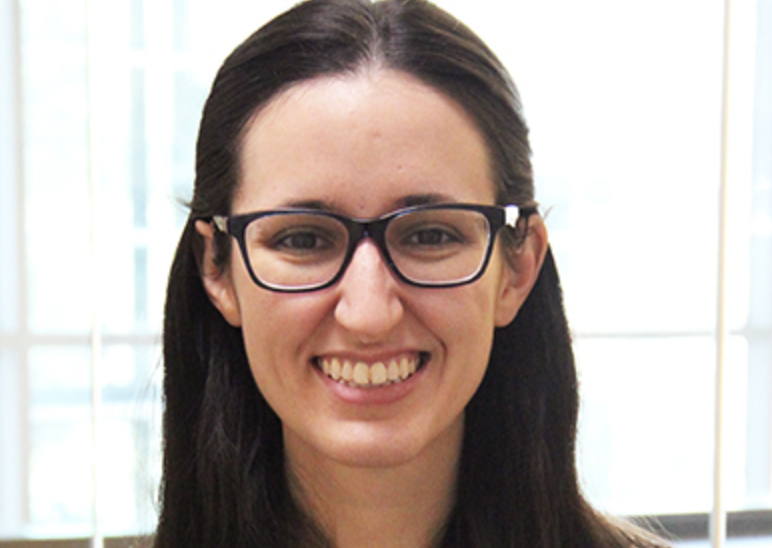International Women’s Day Q&A Spotlight On Renée St. Onge

Renée St. Onge has a simple yet inspiring word of advice for aspiring female scientists: “Don’t let fear limit what you can accomplish!” Renée, an IIDR trainee pursuing her PhD in Marie Elliot’s Lab, talks more about her call for women in science to be assertive; her research on how actinobacteria can survive harsh environmental conditions; and her #BeBoldforChange action to volunteer for the YWCA’s STEM Girls program in her International Women’s Day spotlight.
What does your research focus on?
My research focuses primarily on understanding how a certain group of bacteria called, actinobacteria can survive temporarily harsh environmental conditions. When encountering inhospitable growing conditions, these microbes reduce their metabolic activity and cease to proliferate, thereby becoming dormant. Once conditions improve, they reactivate their metabolism and resume growth. The transition between both states – dormancy and active growth – requires the production of specific proteins called, the ‘resuscitation-promoting factors’ or ‘Rpfs’. I’m studying the means by which these bacteria control the production of these important proteins.
What are the real world applications of your research?
My research has many potential clinical applications. For example, it may lead to the development of a treatment for a number of diseases caused by pathogenic actinobacteria that rely on the Rpfs for virulence. A deeper understanding of how these microbes control the expression of these proteins is the first important step to developing targeted treatment approaches.
What is your dream job?
I hope to work in the area of agricultural microbiology/biotechnology. I feel very strongly about the environment and would love to utilize my background and skills in a way that helps us produce more healthy foods to feed our growing population while at the same time minimizing any negative impact of our agricultural practices on the environment.
What do you love most about being an IIDR trainee?
There are several benefits to being an IIDR trainee. What I love most about this institute is the tremendous expertise of its members and the access to specialized research equipment and facilities.
What is your proudest accomplishment in your academic career thus far?
My proudest achievement so far was receiving the Vanier Canada Graduate Scholarship from the Natural Sciences and Engineering Research Council of Canada, which recognizes academic achievement, research potential and leadership. This scholarship is incredibly competitive and so it was very rewarding to hear that I had won! It just goes to show the amazing things you can achieve when you believe in yourself!
What is your advice for aspiring female scientists?
It’s important for women to be assertive while studying at university. If something doesn’t make sense, ask questions! If you have a different opinion than someone, voice it! I think many of us, at one point or another, have avoided doing so because we worry about what others may think of us, and that in turn limits how much we learn. Don’t let that fear limit what you can accomplish!
Why should women and girls be interested in pursuing a career in science?
Science provides us with a fundamental understanding of nature, and the knowledge gained from our explorations in turn informs the policies that shape our society. It’s important for women to contribute to science and policy, as they have a new and unique perspective.
Do you have a mentor? What are the benefits of having a mentor?
I was very fortunate to have had amazing mentors over the years, both men and women. My thesis supervisor, Dr. Marie Elliot, was an invaluable source of support and encouragement throughout my PhD. Not only has she helped me become a more skilled and critical scientist, but as a woman, she was able to guide me through some of the challenges unique to women working in scientific fields.
The theme for International Women’s Day is “Be Bold for Change” which encourages women to declare what bold action they will take to help drive gender parity. What do you currently do, or what will you do to “Be Bold for Change” in 2017?
I am hoping to start volunteering for YWCA’s new mentoring program for primary school girls interested in STEM fields, appropriately called ‘STEM Girls’. The program encourages young girls, particularly from low-income families, to consider STEM field careers. Mentorship programs like this are instrumental in encouraging women to choose a career in science, particularly in fields that have historically been dominated by men.
Look out for more Q&A spotlights on women at the IIDR throughout March and learn about their fascinating research, achievements, advice for women in science and what they’re doing to #BeBoldForChange in 2017.
NewsRelated News
News Listing

McMaster Health Sciences ➚
Overcoming resistance: McMaster researchers find new utility for old antibiotics
News
January 6, 2025

December 19, 2024


